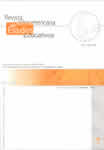Authors
Abstract
The only being that knows that knows and knows what to do with the knowledge is “the human spirit.” Knowledge is understood as the habit or the intellectual virtue by means of which the individual discerns the knowledge and frames it in a Cosmo vision. This dissertation aims at thinking the unit of knowledge from the unit of the “human spirit” which is a condition of the possibility of finding a unit of the knowledge itself. Edgar Morin proposes to consider education as “the ternary character of the human condition” which is: Individual-society-species and he views this ternary condition as an ethical condition, as the starting point of the human acting: “... of the individual autonomies, of the community participations and the conscience of belonging to the human species.” (Morin, 1999, VII). In our reflection, this triad seems to be important but insufficient, for that reason we propose the following triad: desire-freedom-language, from its dialectical relationship where, we believe, the ternary identity of the human spirit can be found. We perceive this proposal as a logic of human existence based on the “onto-do-logy” (the being as a donation) of the French philosopher Claude Bruaire. He resignifies the Hegelian dialectics of logic-nature-spirit, starting from the real human condition (not from the absolute spirit), its concrete freedom, referring to the “desire” instead of the spirit. Said desire moves freedom and is expressed as language. The balance among these constituent forces allows us to understand who the “human spirit” is and in this way, knowing who it is, interpret and discern the place from which a humanizing and personalizing ethos embodied in a constant growing globalizing culture should be built up.
References
________. (1964). L’affirmation de Dieu, essai sur la logique de l’existence. París: Seúl, p. 111.
________. (1985). La dialectique, (12 ed.). P.U.F. Paris: P.U.F.
________. “Hegel”, en Encyclopaedia Universalis, IX, 160.
Ferrater Mora, José. (1984) Diccionario de filosofía. Barcelona: Herder.
Morín, Edgar. (1999) Los siete saberes necesarios para la educación del futuro. UNESCO. Trad. esp.
Memorias del Primer Congreso Internacional de Pensamiento Complejo. Bogotá, noviembre de 2000, pp. 51-52.

 PDF (Español)
PDF (Español)
 FLIP
FLIP



















